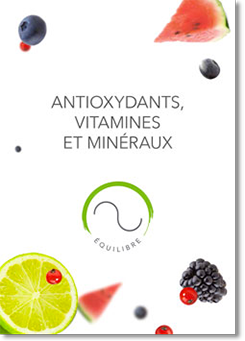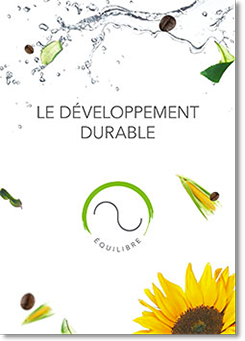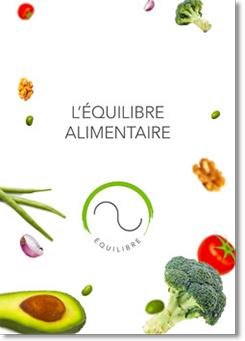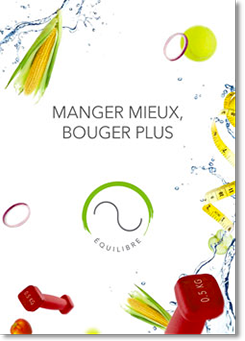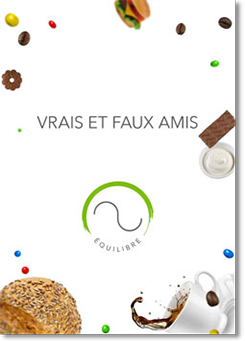Conseil du Mois
Le lait et les produits laitiers, bons pour la santé ?
Dans notre société, le lait est souvent pointé du doigt comme étant l'un des aliments à
l'origine de différents problèmes, notamment digestifs. De nombreuses idées reçues existent à
son sujet, par exemple; « personne ne digère le lait », « le lait n'est bon que pour les veaux »
ou encore « on peut couvrir nos besoins en calcium par bien d'autres moyens ».
Alors que certains disent que le lait n'est pas adapté à l'Homme, d'autres prônent sa
consommation en mettant en avant sa riche teneur en calcium, en phosphore et en vitamine
D, qui interviennent dans la formation des os et des dents et préviennent l'ostéoporose. En
ce qui concerne les autres aliments, d'origine végétale, qui existent pour couvrir les besoins
en calcium, les quantités consommées doivent être importantes pour couvrir les besoins et le
calcium qui les compose est moins bien assimilé que celui d'origine animale. A titre d'exemple,
un yogourt contient 300 mg de calcium. Pour obtenir l'équivalent, il faudrait consommer plus
de 300 g de brocoli ou de tofu ou encore 120 g d'amandes.
La Société Suisse de Nutrition recommande de consommer chaque jour 3 produits laitiers, qui
permettent d'apporter 1 g de calcium à l'organisme. Une portion correspond par exemple à :
2 dl de lait
150-200 g de yogourt, séré ou cottage cheese
30 g de fromage à pâte dure ou 60 g de fromage à pâte molle
Pourquoi de telles recommandations ?
1. Avant tout pour couvrir les besoins en calcium, phosphore et vitamine D de l'organisme.
Le calcium intervient notamment dans la contraction musculaire ; autrement dit dans
le bon fonctionnement du système cardiaque et cérébral. De plus, il est nécessaire à la
coagulation sanguine.
2. Pour couvrir les besoins en protéines et vitamine B12 de l'organisme. Cela permet, avec la
viande, le poisson, les œufs ou les protéines végétales, de compléter les apports protéiques
de la journée. Cette vitamine intervient notamment dans la prévention des maladies
cardiovasculaires.
Il n'y a donc aucun risque lié aux produits laitiers qui, consommés en quantité raisonnable,
sont même essentiels à la santé. Comme pour tout aliment, leur consommation excessive peut
être malsaine car les fromages à pâtes dures sont également riches en graisses et en sel, et
les yogourts aromatisés riches en sucre. C'est pourquoi il est important de varier les sources
de produits laitiers et de privilégier les yogourts nature, à aromatiser soi-même. A contrario,
une consommation insuffisante de produits laitiers peut occasionner de l'ostéoporose ou une
hypocalcémie pouvant conduire à des problèmes cardiaques.
Il est vrai que le système génétique s'adapte à la consommation de lait. Bien que les produits
laitiers ne fassent pas partie des habitudes alimentaires de la population asiatique, elle ne
souffre pas d'ostéoporose. En effet, son organisme est capable de capter le calcium d'autres
aliments (d'origine végétale) de manière plus importante que l'organisme des européens.
Ces derniers, habitués à une consommation ancestrale de produits laitiers, n'ont alors pas
développé cette capacité.
En Suisse, 20% de la population souffre tout de même d'intolérance au lactose, le sucre du
lait, et ne devrait pas consommer de produits laitiers, à moins qu'ils n'en soient exempts.
Dans ce cas, il est intéressant de boire des eaux minérales riches en calcium (>300mg/l) et de
prendre des compléments alimentaires à base de calcium. Il est bon de savoir que les fromages
à pâte dure sont naturellement très pauvres en lactose !
Archives
Avril
Qu'est-ce qui se cache derrière le quinoa ?
TéléchargerAoût
Le lait et les produits laitiers, bons pour la santé ?
TéléchargerOctobre
Le développement durable dans l'assiette
TéléchargerNovembre
Les édulcorants de synthèse : bons ou mauvais pour la santé ?
Télécharger
Animations Fitline
Antioxydants, vitamines
et minéraux
Manger mieux, bougez plus
The environment
Eldora SA has made some important commitments with regard to the environment. Thanks to the outstanding work of its quality department, Eldora SA was granted the precious ISO 14001 certification in 2007.
This certification crowns many years of implementing standards which aim at diminishing the impact that this trade has on the environment. To this effect, meetings were held between operational supervisors, clients and suppliers, in order to conceive a stimulating environmental policy that could be applied by all. This label also stands for the continuous development of new solutions in the use of energy and waste disposal.
Through this company project, Eldora SA wishes to "remain a socially responsible service provider" and take things to yet another level with a ISO 26000 or G.R.I. (Global Reporting Initiative) certification.
In order to meet the expectations of the UNOG and its officials, Eldora SA has put in place a new position which will be in charge of "nutrition and environment". Ms Stéphanie Dreyfuss will oversee the implementation, on-site, of all environmental measures.
In our role as restaurateur, we have been able to identify several areas which can cause a potential impact on the environment.
Raw ingredients
Within the framework of our menus, guests will have the daily choice of participating in the environmental effort by making their choice amongst the wide variety of items produced by organic farming methods, fair trade or local products bearing the label GRTA (Genève Région - Terre et Avenir).
Natura menus give you the certitude that at least one of the components in the dish is part of this commitment towards future generations.
Eldora’s product guidelines also provide a common thread throughout all its restaurants:
- Select first quality products; make no concessions.
- Give priority to regional products that are in season and locally produced.
- Give priority to Swiss meat.
- Select, as far as possible, wild fish with the MSC label that guarantees environmentally-friendly and sustainable fishing methods.
- Use selected oils with the sunflower label “high oleic” for cooking.
- Certify that supplies are obtained for 95 % from approved suppliers who guarantee to respect the standards and instructions elaborated by Eldora.
- Make sure to guarantee the traceability of merchandise, which must be ensured throughout the distribution chain in which each product bears an identification code.
- Define a maximum delivery code in order to limit supplier deliveries.
- Insist that approved suppliers use only appropriate vehicles that meet the latest standards for environmental regulations for deliveries.
We place a lot of importance on the selection of raw ingredients and pay particular attention to the use of seasonal products, local production and environmental labels. To date, the following products have been banned by Eldora’s Purchasing Department:
- Red tuna from the Mediterranean
- Chinese garlic
- Chinese truffles
- Chinese poultry
- Brazilian poultry.
Mastering cleaning products
Within the framework of its ISO 14001-2004 certification, Eldora SA defined with its supplier, the company van Baerle SA, a selection of cleaning products that meet the environmental constraints agreed upon under the ISO 14001-2004 certification.
The company van Baerle SA has undertaken to respect the rules of the “Responsible Care Initiative” as laid out by the International Council of Chemical Associations.
It also conforms to the Business Social Compliance Initiative, an economic initiative for companies who commit to improving working conditions throughout the entire supply chain system.
The company van Baerle SA works in close collaboration with the Agence de l’énergie pour l’économie (AEnEC) (TN: Economic Energy Agency) in order to further reduce its CO2 emissions and improve energy efficiency within the company.
The cleaning and maintenance products used by Eldora SA at the Palais des Nations are part of the “green” line produced by van Baerle SA. These ecological products are grouped in the “Avantgarde” range made up of the lines “Ambiance”, “Ecoline” and “Techno Green”. The cleaning process of the “Ambiance” line relies on the activity of naturally selected bacteria and enzymes. These enable rapid and in-depth elimination of organic residues and odours without changing the materials in any way. The “Ambiance” products have minimum quantities of organic liaisons and are both biodegradable and pH neutral. “Ecoline” et “Techno” products use natural components and perfumes and contain no preservatives or optical brighteners and a very limited amount of phosphates.
Although these products are of organic origin and extremely biodegradable they are none the less very efficient. They are concentrated and used in automatic dosing systems. Specific training in their safe and efficient use is given once a year at the request of the Catering Director and the Eldora SA Sector Manager.
The Nutrition & Environment Manager is also kept up to date on these products and, if need be, may intervene for on-the-spot reminders for our teams.
The fight against waste
The Eldora SA Quality Service has drawn up a good practice guide for sorting waste that every manager is obligated to observe. This enables a large number of materials such as cardboard, PET, metal, glass, oil and paper to be recycled. Kitchen waste is also subject to specific treatment. Every year the Quality Service undertakes an audit to ensure that the guidelines are being followed. Each sales point at UNOG has collection points for mixed waste to be incinerated, PET, aluminium, glass and paper.
Eldora’s staff sorts any waste in the same way when removing trays. Other waste is also recycled: cooking oils, organic waste, metals, IT material and batteries.
Eldora SA works with the specialist Transvoiries SA in Geneva, who ensures the pick-up and recycling of all types of waste. Organic waste and cooking oils are recycled and transformed into biogas.
Since November 2012, Eldora SA has gone even further into the environmental approach. A line of biodegradable coffee cups has been placed at the sales points in the UNOG. After use they are collected and sorted in the sink areas at the Palais des Nations. 90% of the take-away packaging is also biodegradable. Although part of these single-use green containers are disposed of by incineration, their basic composition sends less CO2 into the atmosphere than classic packaging made from petroleum products.
Although we are aware that the least polluting waste is that which is never produced, we encourage our clients on a daily basis to use porcelain tableware that can be washed and reused thousands of times.

